 As the youngest of four boys, Melvin James Kaminsky was his family's center of attention. "I was the baby and I always expected to be the king of France because I was treated like the king of France," he explained. "I'm still waiting for my crown." His mother Kitty, schooled by Irish teachers, spoke with a touch of a brogue. She and his brothers, Irving, Leonard and Bernard, all worked in the garment trade during the Depression. Most in their tenement building aspired to become cutters or salesman. As the youngest of four boys, Melvin James Kaminsky was his family's center of attention. "I was the baby and I always expected to be the king of France because I was treated like the king of France," he explained. "I'm still waiting for my crown." His mother Kitty, schooled by Irish teachers, spoke with a touch of a brogue. She and his brothers, Irving, Leonard and Bernard, all worked in the garment trade during the Depression. Most in their tenement building aspired to become cutters or salesman.
 Brooks attended Eastern District High School in Brooklyn. Beneath his yearbook photograph, he listed his extracurricular activities: "Class Day Committee, Senior Council, Dean's Assistant, Fencing Team." He stated his career goal "To be President of the United States." Upon graduation, the 17-year-old enlisted man was sent to the Virginia Military Institute. "I figured if the army was going to make me an electrical engineer, I wouldn't be blown up," Brooks said. After the war, he briefly studied psychology at Brooklyn College. Brooks attended Eastern District High School in Brooklyn. Beneath his yearbook photograph, he listed his extracurricular activities: "Class Day Committee, Senior Council, Dean's Assistant, Fencing Team." He stated his career goal "To be President of the United States." Upon graduation, the 17-year-old enlisted man was sent to the Virginia Military Institute. "I figured if the army was going to make me an electrical engineer, I wouldn't be blown up," Brooks said. After the war, he briefly studied psychology at Brooklyn College. 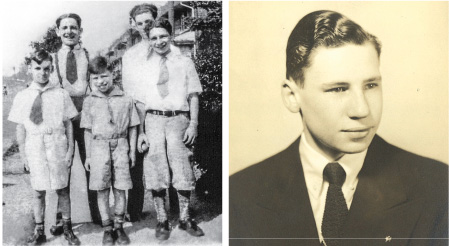
 Brooks gained stage experience during the summer months of his teenage years. At first, he was a busboy and drummer filling in for entertainers in the Catskill Mountains; then a stagehand-turned-director with the low-budget Red Bank Players on the New Jersey shore; and at the end of his army career, a Special Services officer stealing jokes from Bob Hope's USO shows and doing Al Jolson impressions for the troops. "All those shells and bombs going off all around you," Brooks said. "Never mind death, a man could lose his hearing." Brooks gained stage experience during the summer months of his teenage years. At first, he was a busboy and drummer filling in for entertainers in the Catskill Mountains; then a stagehand-turned-director with the low-budget Red Bank Players on the New Jersey shore; and at the end of his army career, a Special Services officer stealing jokes from Bob Hope's USO shows and doing Al Jolson impressions for the troops. "All those shells and bombs going off all around you," Brooks said. "Never mind death, a man could lose his hearing."
 The first blackout skit Brooks ever wrote and performed for a Borscht Belt audience was entitled "S. and M." He and a female staff member met in the center of the stage. "I am a masochist," he said. "I am a sadist," she replied. "Hit me," he said – and she hit him, hard. "Wait a minute, wait a minute, hold it. I think I'm a sadist," he said. Blackout. The first blackout skit Brooks ever wrote and performed for a Borscht Belt audience was entitled "S. and M." He and a female staff member met in the center of the stage. "I am a masochist," he said. "I am a sadist," she replied. "Hit me," he said – and she hit him, hard. "Wait a minute, wait a minute, hold it. I think I'm a sadist," he said. Blackout.
 When Brooks showed up at the stage door of THE ADMIRAL BROADWAY REVUE (1949), he had not been approved by the show's producer Max Liebman and was tossed out by security guards. The star of the program, Sid Caesar, came to the rescue and let Brooks in, eventually paying him $50 a week off the books for comic monologues and gags. "Its jokes and patter are brittle, rowdy, funny and full of satirical references," wrote Time Magazine. When Brooks showed up at the stage door of THE ADMIRAL BROADWAY REVUE (1949), he had not been approved by the show's producer Max Liebman and was tossed out by security guards. The star of the program, Sid Caesar, came to the rescue and let Brooks in, eventually paying him $50 a week off the books for comic monologues and gags. "Its jokes and patter are brittle, rowdy, funny and full of satirical references," wrote Time Magazine.
 LEONARD SILLMAN'S NEW FACES OF 1952 launched the musical careers of Broadway stars Eartha Kitt, Carol Lawrence and Paul Lynde. Brooks supplied the hit show with "Of Fathers and Sons," a spoof of both method acting and Arthur Miller's "Death of a Salesman," with Lynde playing the Willy Loman character as a criminal nearing retirement who is disappointed in his son, a straight-A student. Twentieth Century-Fox produced a film version in 1954 giving its young writer impressive credits in television, film and the legitimate theater. LEONARD SILLMAN'S NEW FACES OF 1952 launched the musical careers of Broadway stars Eartha Kitt, Carol Lawrence and Paul Lynde. Brooks supplied the hit show with "Of Fathers and Sons," a spoof of both method acting and Arthur Miller's "Death of a Salesman," with Lynde playing the Willy Loman character as a criminal nearing retirement who is disappointed in his son, a straight-A student. Twentieth Century-Fox produced a film version in 1954 giving its young writer impressive credits in television, film and the legitimate theater. 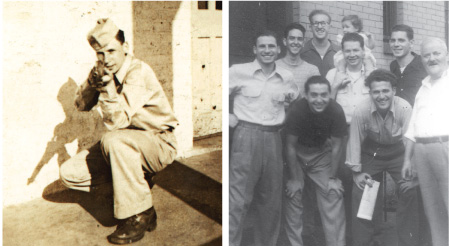
 In 1950, 11 years before his first hit album with Brooks, Carl Reiner came to work at YOUR SHOW OF SHOWS, eager to satirize a new TV show called WE THE PEOPLE SPEAK, in which ordinary folks bore witness to history. "Here with us today, ladies and gentleman," Reiner improvised, "is a man who was actually at the scene of the Crucifixion, two thousand years ago. Isn't that true, sir?" And with Brooks' reply, the 2000 Year Old Man was born. In 1950, 11 years before his first hit album with Brooks, Carl Reiner came to work at YOUR SHOW OF SHOWS, eager to satirize a new TV show called WE THE PEOPLE SPEAK, in which ordinary folks bore witness to history. "Here with us today, ladies and gentleman," Reiner improvised, "is a man who was actually at the scene of the Crucifixion, two thousand years ago. Isn't that true, sir?" And with Brooks' reply, the 2000 Year Old Man was born.
 The inspiration for Brooks' first Academy Award®-winning movie, a three-minute short called THE CRITIC, was an old man he had observed at an art house theater. The man appeared to have stumbled in off the street and was greeted by an esoteric short subject based on animation by Norman McLaren, which preceded the featured foreign film. Working with producer-director Ernest Pintoff and designer-animator Bob Heath, Brooks recreated the situation, improvising his own responses to abstract art: "This is cute... this is nice...vot de hell is it?" The inspiration for Brooks' first Academy Award®-winning movie, a three-minute short called THE CRITIC, was an old man he had observed at an art house theater. The man appeared to have stumbled in off the street and was greeted by an esoteric short subject based on animation by Norman McLaren, which preceded the featured foreign film. Working with producer-director Ernest Pintoff and designer-animator Bob Heath, Brooks recreated the situation, improvising his own responses to abstract art: "This is cute... this is nice...vot de hell is it?"
 Daniel Melnick of Talent Associates introduced Brooks to Buck Henry at his company's mid-town Manhattan office, which was furnished with a pool table. Henry proved to be an excellent shot, and he and Brooks hit it off. The spy parody they co-created was perfectly timed. James Bond was burning up the big screen and THE MAN FROM U.N.C.L.E. attracting viewers on TV. With Americans beginning to question their country's involvement in Vietnam it was a good time to present a bumbling government agent, and GET SMART (1965-70) fit the bill. Daniel Melnick of Talent Associates introduced Brooks to Buck Henry at his company's mid-town Manhattan office, which was furnished with a pool table. Henry proved to be an excellent shot, and he and Brooks hit it off. The spy parody they co-created was perfectly timed. James Bond was burning up the big screen and THE MAN FROM U.N.C.L.E. attracting viewers on TV. With Americans beginning to question their country's involvement in Vietnam it was a good time to present a bumbling government agent, and GET SMART (1965-70) fit the bill. 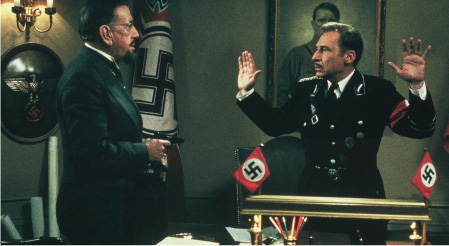
 Throughout the early1960s Brooks worked on a novel called "Springtime for Hitler," whose title was derived from Benn W. Levy's twice-revived 1931 Broadway chestnut "Springtime for Henry." When Brooks turned his idea into a screenplay none of the studio executives he approached were interested. Finally, at New York's Hello Coffee Shop, Brooks pitched the idea to Sidney Glazier, who loved it. With additional funding from Joseph E. Levine's Avco Embassy – and a new title, THE PRODUCERS (1968) – the picture was a go. Throughout the early1960s Brooks worked on a novel called "Springtime for Hitler," whose title was derived from Benn W. Levy's twice-revived 1931 Broadway chestnut "Springtime for Henry." When Brooks turned his idea into a screenplay none of the studio executives he approached were interested. Finally, at New York's Hello Coffee Shop, Brooks pitched the idea to Sidney Glazier, who loved it. With additional funding from Joseph E. Levine's Avco Embassy – and a new title, THE PRODUCERS (1968) – the picture was a go.
 Between THE TWELVE CHAIRS and BLAZING SADDLES, Brooks began voicing the character of the Blond-Haired Cartoon Man on PBS' THE ELECTRIC COMPANY. He continued doing so from 1971 to 1977 – a total of 780 episodes! Brooks taught young viewers to say "I am very cute" instead of "I am cute very." And when his character read the words, "I am not talking," he immediately questioned: "If I am not talking, then whom am I listening to? There's nobody else in the room, so I must be talking. I'm talking!" Between THE TWELVE CHAIRS and BLAZING SADDLES, Brooks began voicing the character of the Blond-Haired Cartoon Man on PBS' THE ELECTRIC COMPANY. He continued doing so from 1971 to 1977 – a total of 780 episodes! Brooks taught young viewers to say "I am very cute" instead of "I am cute very." And when his character read the words, "I am not talking," he immediately questioned: "If I am not talking, then whom am I listening to? There's nobody else in the room, so I must be talking. I'm talking!"
 There was so much laughter on the set during the shooting of THE TWELVE CHAIRS that Brooks bought 100 white handkerchiefs and distributed them to his cast and crew. "I couldn't shoot," he explained. "So I said, 'If you're not in the scene, take this handkerchief, and when you feel you're going to laugh, shove this in your mouth.' And every once in a while, I'd be shooting a scene and I would turn, and I could see a sea of white handkerchiefs. So I said, 'Okay, this is going to be funny. This is good.'" There was so much laughter on the set during the shooting of THE TWELVE CHAIRS that Brooks bought 100 white handkerchiefs and distributed them to his cast and crew. "I couldn't shoot," he explained. "So I said, 'If you're not in the scene, take this handkerchief, and when you feel you're going to laugh, shove this in your mouth.' And every once in a while, I'd be shooting a scene and I would turn, and I could see a sea of white handkerchiefs. So I said, 'Okay, this is going to be funny. This is good.'" 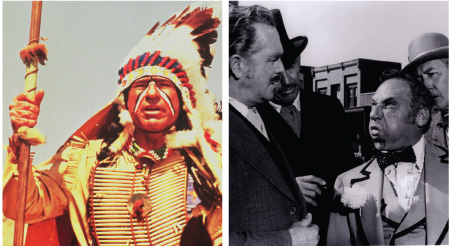
 BLAZING SADDLES (1974) sprang from an Andrew Bergman screenplay entitled "Tex X," which concerned a militant black sheriff in the Old West, whose name was a nod to Malcolm X. Brooks hired Bergman to join him and a team of writers, including Norman Steinberg, Alan Uger and Richard Pryor in creating a go-for-broke send-up of racism, hypocrisy, greed and the cowboy genre. "We're trying to use every Western cliché in the book – in the hope that we'll kill them off in the process," said Brooks. BLAZING SADDLES (1974) sprang from an Andrew Bergman screenplay entitled "Tex X," which concerned a militant black sheriff in the Old West, whose name was a nod to Malcolm X. Brooks hired Bergman to join him and a team of writers, including Norman Steinberg, Alan Uger and Richard Pryor in creating a go-for-broke send-up of racism, hypocrisy, greed and the cowboy genre. "We're trying to use every Western cliché in the book – in the hope that we'll kill them off in the process," said Brooks.
|
|
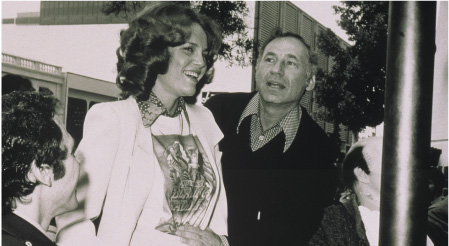
 "Mel is sensual with me," said Madeline Kahn, whose Lily Von Shtupp sent up Marlene Dietrich in DESTRY RIDES AGAIN. "He treats me like an uncle – a dirty uncle. He's an earthy man and very moral underneath." "I love Madeline's rendition of 'I'm Tired,' Brooks stated. "I wrote that for her. I knew what she could do. And man, she really rocked with that – little things like leaning against the top of the set and missing with her hand and nearly falling. I watch it over and over again just to enjoy her genius." "Mel is sensual with me," said Madeline Kahn, whose Lily Von Shtupp sent up Marlene Dietrich in DESTRY RIDES AGAIN. "He treats me like an uncle – a dirty uncle. He's an earthy man and very moral underneath." "I love Madeline's rendition of 'I'm Tired,' Brooks stated. "I wrote that for her. I knew what she could do. And man, she really rocked with that – little things like leaning against the top of the set and missing with her hand and nearly falling. I watch it over and over again just to enjoy her genius." 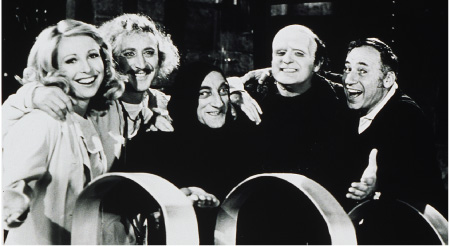
 Brooks insisted that YOUNG FRANKENSTEIN be shot in black and white, in the style of James Whale's original horror classic, which he remembered seeing as a child. When it came time to create the atmosphere of the laboratory in Frankenstein's castle, the filmmaker got lucky. The original lab equipment from the 1931 film was his to use – courtesy of Ken Strickfaden, Whale's designer, who still had much of the original gear in his garage in Santa Monica. Brooks insisted that YOUNG FRANKENSTEIN be shot in black and white, in the style of James Whale's original horror classic, which he remembered seeing as a child. When it came time to create the atmosphere of the laboratory in Frankenstein's castle, the filmmaker got lucky. The original lab equipment from the 1931 film was his to use – courtesy of Ken Strickfaden, Whale's designer, who still had much of the original gear in his garage in Santa Monica.
 "I couldn't resist the fun of somebody saying 'Hold your tongue' and everybody holding their tongues," said Brooks of his 1975 ABC comedy WHEN THINGS WERE ROTTEN. The Robin Hood story had previously turned up in his 2000 Year Old Man routine and later resurfaced in ROBIN HOOD: MEN IN TIGHTS. "Mel was open to ad-libs and bits of business from the actors, many of which had backgrounds in improv and comedy," said star Dick Gautier. Things turned rotten for real when new network management cancelled the series after 13 episodes. "I couldn't resist the fun of somebody saying 'Hold your tongue' and everybody holding their tongues," said Brooks of his 1975 ABC comedy WHEN THINGS WERE ROTTEN. The Robin Hood story had previously turned up in his 2000 Year Old Man routine and later resurfaced in ROBIN HOOD: MEN IN TIGHTS. "Mel was open to ad-libs and bits of business from the actors, many of which had backgrounds in improv and comedy," said star Dick Gautier. Things turned rotten for real when new network management cancelled the series after 13 episodes. 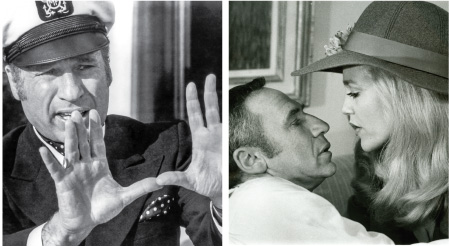
 SILENT MOVIE (1976) used vintage title cards and sight gags to satirize its own making in the era of multinational corporations. Studio executives considered adding some kind of buzz or noise to the soundtrack of the film, fearful that silence would make audiences uncomfortable. Brooks said no. "There won't be any silence," he told the executives. "The people will be laughing. The soundtrack will be the audience itself!" However, "just to be on the safe side," Brooks carpeted the film with 90 minutes of music. SILENT MOVIE (1976) used vintage title cards and sight gags to satirize its own making in the era of multinational corporations. Studio executives considered adding some kind of buzz or noise to the soundtrack of the film, fearful that silence would make audiences uncomfortable. Brooks said no. "There won't be any silence," he told the executives. "The people will be laughing. The soundtrack will be the audience itself!" However, "just to be on the safe side," Brooks carpeted the film with 90 minutes of music.
 Mel Brooks was stunned when he met Alfred Hitchcock to discuss HIGH ANXIETY (1977). "My God, he was a legend when I was just a kid," he told Salon.com. "So I got to meet him and I was asking his advice...It was all based on his films. So I was talking to Hitchcock, and he said, 'Mel, I think what you should do ...' And I said, 'Al, call me Mr. Brooks.' He looked at me like I was a s***head. But then he took a moment, and he burst into laughter." Mel Brooks was stunned when he met Alfred Hitchcock to discuss HIGH ANXIETY (1977). "My God, he was a legend when I was just a kid," he told Salon.com. "So I got to meet him and I was asking his advice...It was all based on his films. So I was talking to Hitchcock, and he said, 'Mel, I think what you should do ...' And I said, 'Al, call me Mr. Brooks.' He looked at me like I was a s***head. But then he took a moment, and he burst into laughter."
 In the French revolution sequence of THE HISTORY OF THE WORLD PART I, Brooks' King Louis XVI plants a kiss on a buxom member of his court and confides in the camera: "It's good to be the king." The phrase caught on and, set to music by Peter Wingfield, became a music video and hip-hop hit, reaching the 67th spot on Billboard's Hot Dance Music/Club Play chart. Two years later, Brooks issued "To Be or Not to Be (The Hitler Rap)," which soared to #12 on the UK charts. In the French revolution sequence of THE HISTORY OF THE WORLD PART I, Brooks' King Louis XVI plants a kiss on a buxom member of his court and confides in the camera: "It's good to be the king." The phrase caught on and, set to music by Peter Wingfield, became a music video and hip-hop hit, reaching the 67th spot on Billboard's Hot Dance Music/Club Play chart. Two years later, Brooks issued "To Be or Not to Be (The Hitler Rap)," which soared to #12 on the UK charts.
 "You only spoof the thing you love," Brooks has said of SPACEBALLS (1987). On GOOD MORNING AMERICA, the director was asked how he chose the targets for his film parodies. "The genre must be part of the American cinema fabric...The audience must know what the clichés are," Brooks explained. "I didn't do a space genre movie when it first came out because it simply wasn't ripe...for that kind of send-up. So I waited until now. And I thought, 'Okay, space. It's your turn!' "You only spoof the thing you love," Brooks has said of SPACEBALLS (1987). On GOOD MORNING AMERICA, the director was asked how he chose the targets for his film parodies. "The genre must be part of the American cinema fabric...The audience must know what the clichés are," Brooks explained. "I didn't do a space genre movie when it first came out because it simply wasn't ripe...for that kind of send-up. So I waited until now. And I thought, 'Okay, space. It's your turn!' 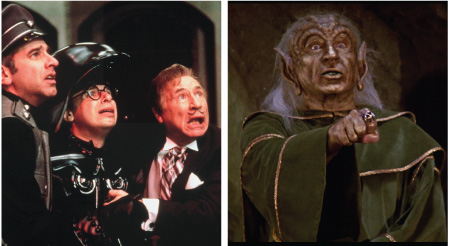
 Brooks played dual roles in SPACEBALLS – evil President Skroob (an anagram for you-know-who) and Yogurt, a send-up of Yoda from STAR WARS covered in glittering gold paint. "They say, 'Yogurt the magnificent, Yogurt the wise, Yogurt the marvelous, Yogurt the incredible, Yogurt the unbelievable,'" said Brooks. "And I said, 'Stop, stop, I'm just plain Yogurt.' According to Brooks, the funny role was nearly life-threatening. "My eyes broke out because of the fumes of the gold paint...I'm supposed to chalk it up to show business, but I almost died." Brooks played dual roles in SPACEBALLS – evil President Skroob (an anagram for you-know-who) and Yogurt, a send-up of Yoda from STAR WARS covered in glittering gold paint. "They say, 'Yogurt the magnificent, Yogurt the wise, Yogurt the marvelous, Yogurt the incredible, Yogurt the unbelievable,'" said Brooks. "And I said, 'Stop, stop, I'm just plain Yogurt.' According to Brooks, the funny role was nearly life-threatening. "My eyes broke out because of the fumes of the gold paint...I'm supposed to chalk it up to show business, but I almost died."
 James L. Brooks, one of the creators of the TRACEY ULLMAN SHOW (1990), invited Mel Brooks (no relation) to appear as Buzz Schlanger, a desperate film director, in an episode written by Marc Flanagan. "One of the punch lines was, 'Yeah, he's going up Thursday,'" Flanagan recalled. "Mel asked if he could change 'Thursday' to 'Tuesday.' 'Of course,' I responded. Mel instructs, 'Tuesday is a lot funnier then Thursday.' Now, I was hardly going to argue with Mel about the comic validity of switching days of the week." James L. Brooks, one of the creators of the TRACEY ULLMAN SHOW (1990), invited Mel Brooks (no relation) to appear as Buzz Schlanger, a desperate film director, in an episode written by Marc Flanagan. "One of the punch lines was, 'Yeah, he's going up Thursday,'" Flanagan recalled. "Mel asked if he could change 'Thursday' to 'Tuesday.' 'Of course,' I responded. Mel instructs, 'Tuesday is a lot funnier then Thursday.' Now, I was hardly going to argue with Mel about the comic validity of switching days of the week."
 Brooks won three Emmy awards as Uncle Phil on the hit series MAD ABOUT YOU, which starred Paul Reiser and Helen Hunt. "I asked Paul if I could ad-lib," Brooks explained. "He said, 'Absolutely.' I said, 'I might throw you off.' He said, 'Don't worry about that.' And I did try to throw him off and say some crazy things at different times. And they never expected me to comb my hair in a bizarre and weird fashion, which I did...It was fun...every time I did it." Brooks won three Emmy awards as Uncle Phil on the hit series MAD ABOUT YOU, which starred Paul Reiser and Helen Hunt. "I asked Paul if I could ad-lib," Brooks explained. "He said, 'Absolutely.' I said, 'I might throw you off.' He said, 'Don't worry about that.' And I did try to throw him off and say some crazy things at different times. And they never expected me to comb my hair in a bizarre and weird fashion, which I did...It was fun...every time I did it."
 The German publication Der Spiegel asked Brooks if he could get revenge on Hitler in "The Producers." "Yes, absolutely," the filmmaker replied. "Of course it is impossible to take revenge for six million murdered Jews. But by using the medium of comedy, we can try to rob Hitler of his posthumous power and myths...Hitler must have had a magnetic attractive force, like a rock star...So it's only fitting when comic actors make him the limelight hog of world history. We take away from him the holy seriousness that always surrounded him..." The German publication Der Spiegel asked Brooks if he could get revenge on Hitler in "The Producers." "Yes, absolutely," the filmmaker replied. "Of course it is impossible to take revenge for six million murdered Jews. But by using the medium of comedy, we can try to rob Hitler of his posthumous power and myths...Hitler must have had a magnetic attractive force, like a rock star...So it's only fitting when comic actors make him the limelight hog of world history. We take away from him the holy seriousness that always surrounded him..." 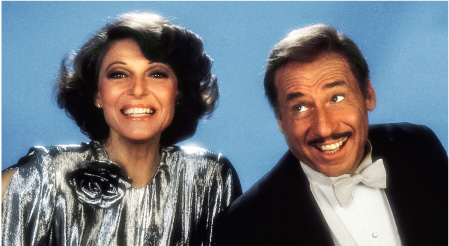
 Brooks and Bancroft play a polish husband-and-wife acting team in TO BE OR NOT TO BE (1982). According to Dom DeLuise, "[Brooks] and his wife were having a fight one time and Anne said that they were yelling at each other, and he made a gesture with his fist, like 'Oooooohhh.' She said, 'Don't you dare hit my instrument.' And he said, 'Oh yeah? Well, play me 'Melancholy Baby,' and they went from rage to laughing... Anne and Mel were wonderful together." Brooks and Bancroft play a polish husband-and-wife acting team in TO BE OR NOT TO BE (1982). According to Dom DeLuise, "[Brooks] and his wife were having a fight one time and Anne said that they were yelling at each other, and he made a gesture with his fist, like 'Oooooohhh.' She said, 'Don't you dare hit my instrument.' And he said, 'Oh yeah? Well, play me 'Melancholy Baby,' and they went from rage to laughing... Anne and Mel were wonderful together."
|



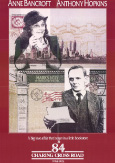

 As the youngest of four boys, Melvin James Kaminsky was his family's center of attention. "I was the baby and I always expected to be the king of France because I was treated like the king of France," he explained. "I'm still waiting for my crown." His mother Kitty, schooled by Irish teachers, spoke with a touch of a brogue. She and his brothers, Irving, Leonard and Bernard, all worked in the garment trade during the Depression. Most in their tenement building aspired to become cutters or salesman.
As the youngest of four boys, Melvin James Kaminsky was his family's center of attention. "I was the baby and I always expected to be the king of France because I was treated like the king of France," he explained. "I'm still waiting for my crown." His mother Kitty, schooled by Irish teachers, spoke with a touch of a brogue. She and his brothers, Irving, Leonard and Bernard, all worked in the garment trade during the Depression. Most in their tenement building aspired to become cutters or salesman. Brooks attended Eastern District High School in Brooklyn. Beneath his yearbook photograph, he listed his extracurricular activities: "Class Day Committee, Senior Council, Dean's Assistant, Fencing Team." He stated his career goal "To be President of the United States." Upon graduation, the 17-year-old enlisted man was sent to the Virginia Military Institute. "I figured if the army was going to make me an electrical engineer, I wouldn't be blown up," Brooks said. After the war, he briefly studied psychology at Brooklyn College.
Brooks attended Eastern District High School in Brooklyn. Beneath his yearbook photograph, he listed his extracurricular activities: "Class Day Committee, Senior Council, Dean's Assistant, Fencing Team." He stated his career goal "To be President of the United States." Upon graduation, the 17-year-old enlisted man was sent to the Virginia Military Institute. "I figured if the army was going to make me an electrical engineer, I wouldn't be blown up," Brooks said. After the war, he briefly studied psychology at Brooklyn College. 
 Brooks gained stage experience during the summer months of his teenage years. At first, he was a busboy and drummer filling in for entertainers in the Catskill Mountains; then a stagehand-turned-director with the low-budget Red Bank Players on the New Jersey shore; and at the end of his army career, a Special Services officer stealing jokes from Bob Hope's USO shows and doing Al Jolson impressions for the troops. "All those shells and bombs going off all around you," Brooks said. "Never mind death, a man could lose his hearing."
Brooks gained stage experience during the summer months of his teenage years. At first, he was a busboy and drummer filling in for entertainers in the Catskill Mountains; then a stagehand-turned-director with the low-budget Red Bank Players on the New Jersey shore; and at the end of his army career, a Special Services officer stealing jokes from Bob Hope's USO shows and doing Al Jolson impressions for the troops. "All those shells and bombs going off all around you," Brooks said. "Never mind death, a man could lose his hearing." The first blackout skit Brooks ever wrote and performed for a Borscht Belt audience was entitled "S. and M." He and a female staff member met in the center of the stage. "I am a masochist," he said. "I am a sadist," she replied. "Hit me," he said – and she hit him, hard. "Wait a minute, wait a minute, hold it. I think I'm a sadist," he said. Blackout.
The first blackout skit Brooks ever wrote and performed for a Borscht Belt audience was entitled "S. and M." He and a female staff member met in the center of the stage. "I am a masochist," he said. "I am a sadist," she replied. "Hit me," he said – and she hit him, hard. "Wait a minute, wait a minute, hold it. I think I'm a sadist," he said. Blackout. When Brooks showed up at the stage door of THE ADMIRAL BROADWAY REVUE (1949), he had not been approved by the show's producer Max Liebman and was tossed out by security guards. The star of the program, Sid Caesar, came to the rescue and let Brooks in, eventually paying him $50 a week off the books for comic monologues and gags. "Its jokes and patter are brittle, rowdy, funny and full of satirical references," wrote Time Magazine.
When Brooks showed up at the stage door of THE ADMIRAL BROADWAY REVUE (1949), he had not been approved by the show's producer Max Liebman and was tossed out by security guards. The star of the program, Sid Caesar, came to the rescue and let Brooks in, eventually paying him $50 a week off the books for comic monologues and gags. "Its jokes and patter are brittle, rowdy, funny and full of satirical references," wrote Time Magazine. LEONARD SILLMAN'S NEW FACES OF 1952 launched the musical careers of Broadway stars Eartha Kitt, Carol Lawrence and Paul Lynde. Brooks supplied the hit show with "Of Fathers and Sons," a spoof of both method acting and Arthur Miller's "Death of a Salesman," with Lynde playing the Willy Loman character as a criminal nearing retirement who is disappointed in his son, a straight-A student. Twentieth Century-Fox produced a film version in 1954 giving its young writer impressive credits in television, film and the legitimate theater.
LEONARD SILLMAN'S NEW FACES OF 1952 launched the musical careers of Broadway stars Eartha Kitt, Carol Lawrence and Paul Lynde. Brooks supplied the hit show with "Of Fathers and Sons," a spoof of both method acting and Arthur Miller's "Death of a Salesman," with Lynde playing the Willy Loman character as a criminal nearing retirement who is disappointed in his son, a straight-A student. Twentieth Century-Fox produced a film version in 1954 giving its young writer impressive credits in television, film and the legitimate theater. 
 In 1950, 11 years before his first hit album with Brooks, Carl Reiner came to work at YOUR SHOW OF SHOWS, eager to satirize a new TV show called WE THE PEOPLE SPEAK, in which ordinary folks bore witness to history. "Here with us today, ladies and gentleman," Reiner improvised, "is a man who was actually at the scene of the Crucifixion, two thousand years ago. Isn't that true, sir?" And with Brooks' reply, the 2000 Year Old Man was born.
In 1950, 11 years before his first hit album with Brooks, Carl Reiner came to work at YOUR SHOW OF SHOWS, eager to satirize a new TV show called WE THE PEOPLE SPEAK, in which ordinary folks bore witness to history. "Here with us today, ladies and gentleman," Reiner improvised, "is a man who was actually at the scene of the Crucifixion, two thousand years ago. Isn't that true, sir?" And with Brooks' reply, the 2000 Year Old Man was born. The inspiration for Brooks' first Academy Award®-winning movie, a three-minute short called THE CRITIC, was an old man he had observed at an art house theater. The man appeared to have stumbled in off the street and was greeted by an esoteric short subject based on animation by Norman McLaren, which preceded the featured foreign film. Working with producer-director Ernest Pintoff and designer-animator Bob Heath, Brooks recreated the situation, improvising his own responses to abstract art: "This is cute... this is nice...vot de hell is it?"
The inspiration for Brooks' first Academy Award®-winning movie, a three-minute short called THE CRITIC, was an old man he had observed at an art house theater. The man appeared to have stumbled in off the street and was greeted by an esoteric short subject based on animation by Norman McLaren, which preceded the featured foreign film. Working with producer-director Ernest Pintoff and designer-animator Bob Heath, Brooks recreated the situation, improvising his own responses to abstract art: "This is cute... this is nice...vot de hell is it?" Daniel Melnick of Talent Associates introduced Brooks to Buck Henry at his company's mid-town Manhattan office, which was furnished with a pool table. Henry proved to be an excellent shot, and he and Brooks hit it off. The spy parody they co-created was perfectly timed. James Bond was burning up the big screen and THE MAN FROM U.N.C.L.E. attracting viewers on TV. With Americans beginning to question their country's involvement in Vietnam it was a good time to present a bumbling government agent, and GET SMART (1965-70) fit the bill.
Daniel Melnick of Talent Associates introduced Brooks to Buck Henry at his company's mid-town Manhattan office, which was furnished with a pool table. Henry proved to be an excellent shot, and he and Brooks hit it off. The spy parody they co-created was perfectly timed. James Bond was burning up the big screen and THE MAN FROM U.N.C.L.E. attracting viewers on TV. With Americans beginning to question their country's involvement in Vietnam it was a good time to present a bumbling government agent, and GET SMART (1965-70) fit the bill. 
 Throughout the early1960s Brooks worked on a novel called "Springtime for Hitler," whose title was derived from Benn W. Levy's twice-revived 1931 Broadway chestnut "Springtime for Henry." When Brooks turned his idea into a screenplay none of the studio executives he approached were interested. Finally, at New York's Hello Coffee Shop, Brooks pitched the idea to Sidney Glazier, who loved it. With additional funding from Joseph E. Levine's Avco Embassy – and a new title, THE PRODUCERS (1968) – the picture was a go.
Throughout the early1960s Brooks worked on a novel called "Springtime for Hitler," whose title was derived from Benn W. Levy's twice-revived 1931 Broadway chestnut "Springtime for Henry." When Brooks turned his idea into a screenplay none of the studio executives he approached were interested. Finally, at New York's Hello Coffee Shop, Brooks pitched the idea to Sidney Glazier, who loved it. With additional funding from Joseph E. Levine's Avco Embassy – and a new title, THE PRODUCERS (1968) – the picture was a go. Between THE TWELVE CHAIRS and BLAZING SADDLES, Brooks began voicing the character of the Blond-Haired Cartoon Man on PBS' THE ELECTRIC COMPANY. He continued doing so from 1971 to 1977 – a total of 780 episodes! Brooks taught young viewers to say "I am very cute" instead of "I am cute very." And when his character read the words, "I am not talking," he immediately questioned: "If I am not talking, then whom am I listening to? There's nobody else in the room, so I must be talking. I'm talking!"
Between THE TWELVE CHAIRS and BLAZING SADDLES, Brooks began voicing the character of the Blond-Haired Cartoon Man on PBS' THE ELECTRIC COMPANY. He continued doing so from 1971 to 1977 – a total of 780 episodes! Brooks taught young viewers to say "I am very cute" instead of "I am cute very." And when his character read the words, "I am not talking," he immediately questioned: "If I am not talking, then whom am I listening to? There's nobody else in the room, so I must be talking. I'm talking!" There was so much laughter on the set during the shooting of THE TWELVE CHAIRS that Brooks bought 100 white handkerchiefs and distributed them to his cast and crew. "I couldn't shoot," he explained. "So I said, 'If you're not in the scene, take this handkerchief, and when you feel you're going to laugh, shove this in your mouth.' And every once in a while, I'd be shooting a scene and I would turn, and I could see a sea of white handkerchiefs. So I said, 'Okay, this is going to be funny. This is good.'"
There was so much laughter on the set during the shooting of THE TWELVE CHAIRS that Brooks bought 100 white handkerchiefs and distributed them to his cast and crew. "I couldn't shoot," he explained. "So I said, 'If you're not in the scene, take this handkerchief, and when you feel you're going to laugh, shove this in your mouth.' And every once in a while, I'd be shooting a scene and I would turn, and I could see a sea of white handkerchiefs. So I said, 'Okay, this is going to be funny. This is good.'" 
 BLAZING SADDLES (1974) sprang from an Andrew Bergman screenplay entitled "Tex X," which concerned a militant black sheriff in the Old West, whose name was a nod to Malcolm X. Brooks hired Bergman to join him and a team of writers, including Norman Steinberg, Alan Uger and Richard Pryor in creating a go-for-broke send-up of racism, hypocrisy, greed and the cowboy genre. "We're trying to use every Western cliché in the book – in the hope that we'll kill them off in the process," said Brooks.
BLAZING SADDLES (1974) sprang from an Andrew Bergman screenplay entitled "Tex X," which concerned a militant black sheriff in the Old West, whose name was a nod to Malcolm X. Brooks hired Bergman to join him and a team of writers, including Norman Steinberg, Alan Uger and Richard Pryor in creating a go-for-broke send-up of racism, hypocrisy, greed and the cowboy genre. "We're trying to use every Western cliché in the book – in the hope that we'll kill them off in the process," said Brooks.
 "Mel is sensual with me," said Madeline Kahn, whose Lily Von Shtupp sent up Marlene Dietrich in DESTRY RIDES AGAIN. "He treats me like an uncle – a dirty uncle. He's an earthy man and very moral underneath." "I love Madeline's rendition of 'I'm Tired,' Brooks stated. "I wrote that for her. I knew what she could do. And man, she really rocked with that – little things like leaning against the top of the set and missing with her hand and nearly falling. I watch it over and over again just to enjoy her genius."
"Mel is sensual with me," said Madeline Kahn, whose Lily Von Shtupp sent up Marlene Dietrich in DESTRY RIDES AGAIN. "He treats me like an uncle – a dirty uncle. He's an earthy man and very moral underneath." "I love Madeline's rendition of 'I'm Tired,' Brooks stated. "I wrote that for her. I knew what she could do. And man, she really rocked with that – little things like leaning against the top of the set and missing with her hand and nearly falling. I watch it over and over again just to enjoy her genius." 
 Brooks insisted that YOUNG FRANKENSTEIN be shot in black and white, in the style of James Whale's original horror classic, which he remembered seeing as a child. When it came time to create the atmosphere of the laboratory in Frankenstein's castle, the filmmaker got lucky. The original lab equipment from the 1931 film was his to use – courtesy of Ken Strickfaden, Whale's designer, who still had much of the original gear in his garage in Santa Monica.
Brooks insisted that YOUNG FRANKENSTEIN be shot in black and white, in the style of James Whale's original horror classic, which he remembered seeing as a child. When it came time to create the atmosphere of the laboratory in Frankenstein's castle, the filmmaker got lucky. The original lab equipment from the 1931 film was his to use – courtesy of Ken Strickfaden, Whale's designer, who still had much of the original gear in his garage in Santa Monica. "I couldn't resist the fun of somebody saying 'Hold your tongue' and everybody holding their tongues," said Brooks of his 1975 ABC comedy WHEN THINGS WERE ROTTEN. The Robin Hood story had previously turned up in his 2000 Year Old Man routine and later resurfaced in ROBIN HOOD: MEN IN TIGHTS. "Mel was open to ad-libs and bits of business from the actors, many of which had backgrounds in improv and comedy," said star Dick Gautier. Things turned rotten for real when new network management cancelled the series after 13 episodes.
"I couldn't resist the fun of somebody saying 'Hold your tongue' and everybody holding their tongues," said Brooks of his 1975 ABC comedy WHEN THINGS WERE ROTTEN. The Robin Hood story had previously turned up in his 2000 Year Old Man routine and later resurfaced in ROBIN HOOD: MEN IN TIGHTS. "Mel was open to ad-libs and bits of business from the actors, many of which had backgrounds in improv and comedy," said star Dick Gautier. Things turned rotten for real when new network management cancelled the series after 13 episodes. 
 SILENT MOVIE (1976) used vintage title cards and sight gags to satirize its own making in the era of multinational corporations. Studio executives considered adding some kind of buzz or noise to the soundtrack of the film, fearful that silence would make audiences uncomfortable. Brooks said no. "There won't be any silence," he told the executives. "The people will be laughing. The soundtrack will be the audience itself!" However, "just to be on the safe side," Brooks carpeted the film with 90 minutes of music.
SILENT MOVIE (1976) used vintage title cards and sight gags to satirize its own making in the era of multinational corporations. Studio executives considered adding some kind of buzz or noise to the soundtrack of the film, fearful that silence would make audiences uncomfortable. Brooks said no. "There won't be any silence," he told the executives. "The people will be laughing. The soundtrack will be the audience itself!" However, "just to be on the safe side," Brooks carpeted the film with 90 minutes of music. Mel Brooks was stunned when he met Alfred Hitchcock to discuss HIGH ANXIETY (1977). "My God, he was a legend when I was just a kid," he told Salon.com. "So I got to meet him and I was asking his advice...It was all based on his films. So I was talking to Hitchcock, and he said, 'Mel, I think what you should do ...' And I said, 'Al, call me Mr. Brooks.' He looked at me like I was a s***head. But then he took a moment, and he burst into laughter."
Mel Brooks was stunned when he met Alfred Hitchcock to discuss HIGH ANXIETY (1977). "My God, he was a legend when I was just a kid," he told Salon.com. "So I got to meet him and I was asking his advice...It was all based on his films. So I was talking to Hitchcock, and he said, 'Mel, I think what you should do ...' And I said, 'Al, call me Mr. Brooks.' He looked at me like I was a s***head. But then he took a moment, and he burst into laughter." In the French revolution sequence of THE HISTORY OF THE WORLD PART I, Brooks' King Louis XVI plants a kiss on a buxom member of his court and confides in the camera: "It's good to be the king." The phrase caught on and, set to music by Peter Wingfield, became a music video and hip-hop hit, reaching the 67th spot on Billboard's Hot Dance Music/Club Play chart. Two years later, Brooks issued "To Be or Not to Be (The Hitler Rap)," which soared to #12 on the UK charts.
In the French revolution sequence of THE HISTORY OF THE WORLD PART I, Brooks' King Louis XVI plants a kiss on a buxom member of his court and confides in the camera: "It's good to be the king." The phrase caught on and, set to music by Peter Wingfield, became a music video and hip-hop hit, reaching the 67th spot on Billboard's Hot Dance Music/Club Play chart. Two years later, Brooks issued "To Be or Not to Be (The Hitler Rap)," which soared to #12 on the UK charts. "You only spoof the thing you love," Brooks has said of SPACEBALLS (1987). On GOOD MORNING AMERICA, the director was asked how he chose the targets for his film parodies. "The genre must be part of the American cinema fabric...The audience must know what the clichés are," Brooks explained. "I didn't do a space genre movie when it first came out because it simply wasn't ripe...for that kind of send-up. So I waited until now. And I thought, 'Okay, space. It's your turn!'
"You only spoof the thing you love," Brooks has said of SPACEBALLS (1987). On GOOD MORNING AMERICA, the director was asked how he chose the targets for his film parodies. "The genre must be part of the American cinema fabric...The audience must know what the clichés are," Brooks explained. "I didn't do a space genre movie when it first came out because it simply wasn't ripe...for that kind of send-up. So I waited until now. And I thought, 'Okay, space. It's your turn!' 
 Brooks played dual roles in SPACEBALLS – evil President Skroob (an anagram for you-know-who) and Yogurt, a send-up of Yoda from STAR WARS covered in glittering gold paint. "They say, 'Yogurt the magnificent, Yogurt the wise, Yogurt the marvelous, Yogurt the incredible, Yogurt the unbelievable,'" said Brooks. "And I said, 'Stop, stop, I'm just plain Yogurt.' According to Brooks, the funny role was nearly life-threatening. "My eyes broke out because of the fumes of the gold paint...I'm supposed to chalk it up to show business, but I almost died."
Brooks played dual roles in SPACEBALLS – evil President Skroob (an anagram for you-know-who) and Yogurt, a send-up of Yoda from STAR WARS covered in glittering gold paint. "They say, 'Yogurt the magnificent, Yogurt the wise, Yogurt the marvelous, Yogurt the incredible, Yogurt the unbelievable,'" said Brooks. "And I said, 'Stop, stop, I'm just plain Yogurt.' According to Brooks, the funny role was nearly life-threatening. "My eyes broke out because of the fumes of the gold paint...I'm supposed to chalk it up to show business, but I almost died." James L. Brooks, one of the creators of the TRACEY ULLMAN SHOW (1990), invited Mel Brooks (no relation) to appear as Buzz Schlanger, a desperate film director, in an episode written by Marc Flanagan. "One of the punch lines was, 'Yeah, he's going up Thursday,'" Flanagan recalled. "Mel asked if he could change 'Thursday' to 'Tuesday.' 'Of course,' I responded. Mel instructs, 'Tuesday is a lot funnier then Thursday.' Now, I was hardly going to argue with Mel about the comic validity of switching days of the week."
James L. Brooks, one of the creators of the TRACEY ULLMAN SHOW (1990), invited Mel Brooks (no relation) to appear as Buzz Schlanger, a desperate film director, in an episode written by Marc Flanagan. "One of the punch lines was, 'Yeah, he's going up Thursday,'" Flanagan recalled. "Mel asked if he could change 'Thursday' to 'Tuesday.' 'Of course,' I responded. Mel instructs, 'Tuesday is a lot funnier then Thursday.' Now, I was hardly going to argue with Mel about the comic validity of switching days of the week." Brooks won three Emmy awards as Uncle Phil on the hit series MAD ABOUT YOU, which starred Paul Reiser and Helen Hunt. "I asked Paul if I could ad-lib," Brooks explained. "He said, 'Absolutely.' I said, 'I might throw you off.' He said, 'Don't worry about that.' And I did try to throw him off and say some crazy things at different times. And they never expected me to comb my hair in a bizarre and weird fashion, which I did...It was fun...every time I did it."
Brooks won three Emmy awards as Uncle Phil on the hit series MAD ABOUT YOU, which starred Paul Reiser and Helen Hunt. "I asked Paul if I could ad-lib," Brooks explained. "He said, 'Absolutely.' I said, 'I might throw you off.' He said, 'Don't worry about that.' And I did try to throw him off and say some crazy things at different times. And they never expected me to comb my hair in a bizarre and weird fashion, which I did...It was fun...every time I did it." The German publication Der Spiegel asked Brooks if he could get revenge on Hitler in "The Producers." "Yes, absolutely," the filmmaker replied. "Of course it is impossible to take revenge for six million murdered Jews. But by using the medium of comedy, we can try to rob Hitler of his posthumous power and myths...Hitler must have had a magnetic attractive force, like a rock star...So it's only fitting when comic actors make him the limelight hog of world history. We take away from him the holy seriousness that always surrounded him..."
The German publication Der Spiegel asked Brooks if he could get revenge on Hitler in "The Producers." "Yes, absolutely," the filmmaker replied. "Of course it is impossible to take revenge for six million murdered Jews. But by using the medium of comedy, we can try to rob Hitler of his posthumous power and myths...Hitler must have had a magnetic attractive force, like a rock star...So it's only fitting when comic actors make him the limelight hog of world history. We take away from him the holy seriousness that always surrounded him..." 
 Brooks and Bancroft play a polish husband-and-wife acting team in TO BE OR NOT TO BE (1982). According to Dom DeLuise, "[Brooks] and his wife were having a fight one time and Anne said that they were yelling at each other, and he made a gesture with his fist, like 'Oooooohhh.' She said, 'Don't you dare hit my instrument.' And he said, 'Oh yeah? Well, play me 'Melancholy Baby,' and they went from rage to laughing... Anne and Mel were wonderful together."
Brooks and Bancroft play a polish husband-and-wife acting team in TO BE OR NOT TO BE (1982). According to Dom DeLuise, "[Brooks] and his wife were having a fight one time and Anne said that they were yelling at each other, and he made a gesture with his fist, like 'Oooooohhh.' She said, 'Don't you dare hit my instrument.' And he said, 'Oh yeah? Well, play me 'Melancholy Baby,' and they went from rage to laughing... Anne and Mel were wonderful together."